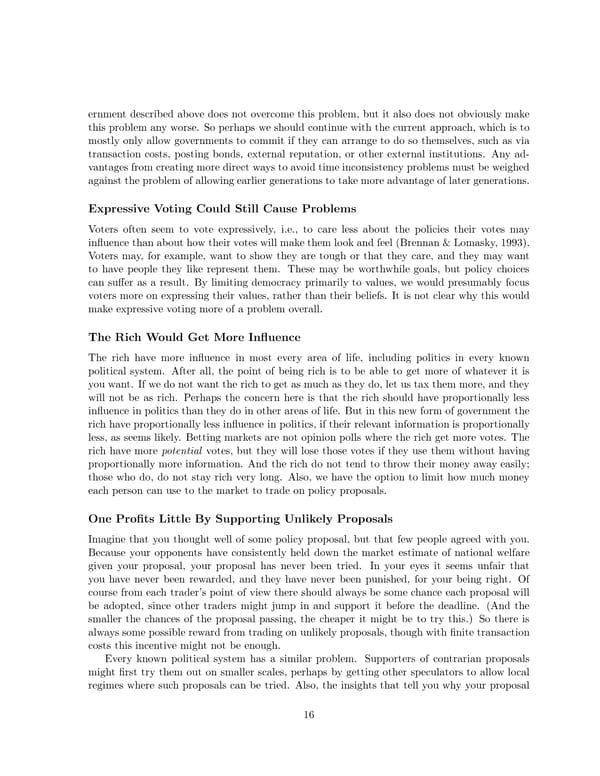ernment described above does not overcome this problem, but it also does not obviously make this problem any worse. So perhaps we should continue with the current approach, which is to mostly only allow governments to commit if they can arrange to do so themselves, such as via transaction costs, posting bonds, external reputation, or other external institutions. Any ad- vantages from creating more direct ways to avoid time inconsistency problems must be weighed against the problem of allowing earlier generations to take more advantage of later generations. Expressive Voting Could Still Cause Problems Voters often seem to vote expressively, i.e., to care less about the policies their votes may influence than about how their votes will make them look and feel (Brennan & Lomasky, 1993). Voters may, for example, want to show they are tough or that they care, and they may want to have people they like represent them. These may be worthwhile goals, but policy choices can suffer as a result. By limiting democracy primarily to values, we would presumably focus voters more on expressing their values, rather than their beliefs. It is not clear why this would make expressive voting more of a problem overall. The Rich Would Get More Influence The rich have more influence in most every area of life, including politics in every known political system. After all, the point of being rich is to be able to get more of whatever it is you want. If we do not want the rich to get as much as they do, let us tax them more, and they will not be as rich. Perhaps the concern here is that the rich should have proportionally less influence in politics than they do in other areas of life. But in this new form of government the rich have proportionally less influence in politics, if their relevant information is proportionally less, as seems likely. Betting markets are not opinion polls where the rich get more votes. The rich have more potential votes, but they will lose those votes if they use them without having proportionally more information. And the rich do not tend to throw their money away easily; those who do, do not stay rich very long. Also, we have the option to limit how much money each person can use to the market to trade on policy proposals. One Profits Little By Supporting Unlikely Proposals Imagine that you thought well of some policy proposal, but that few people agreed with you. Because your opponents have consistently held down the market estimate of national welfare given your proposal, your proposal has never been tried. In your eyes it seems unfair that you have never been rewarded, and they have never been punished, for your being right. Of course from each trader’s point of view there should always be some chance each proposal will be adopted, since other traders might jump in and support it before the deadline. (And the smaller the chances of the proposal passing, the cheaper it might be to try this.) So there is always some possible reward from trading on unlikely proposals, though with finite transaction costs this incentive might not be enough. Every known political system has a similar problem. Supporters of contrarian proposals might first try them out on smaller scales, perhaps by getting other speculators to allow local regimes where such proposals can be tried. Also, the insights that tell you why your proposal 16
 Shall We Vote on Values, But Bet on Beliefs? Page 17 Page 19
Shall We Vote on Values, But Bet on Beliefs? Page 17 Page 19